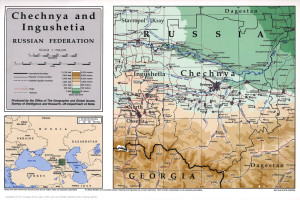Why the Jihadi Threat to Russia Is Getting Worse

More jihadi fighters come from Russia than any country outside the Middle East and North Africa. What happens when they come home?
(Bloomberg – bloomberg.com – Carol Matlack – March 30, 2015)
The deadly terror attacks in Paris in January underscored the risk facing Western Europe as jihadis return home from fighting in Syria and Iraq. But the place that most foreign jihadis call home isn’t Western Europe. It’s Russia.
The number of Russian nationals fighting alongside Islamic State forces in Syria and Iraq has roughly doubled over the past year, to a range of 1,500 to 1,700, according to recent estimates by the head of Russia’s FSB security agency and by the Kremlin’s envoy to Chechnya. Russian and Western analysts have said that about 1,000 Russian-speaking jihadis took part in an Islamic State assault last year on Iraq’s Anbar province that was led by a fighter known as Omar the Chechen.
That means Russia is now supplying far more jihadis than any country outside the Middle East and North Africa. (France, the biggest European source of fighters, has said that about 900 of its citizens received training in Syria, with about 300 remaining there in 2014.)
Jihadi groups have stepped up recruiting in the historically Muslim North Caucasus region of Russia that includes Chechnya and Dagestan. The region is home to a longstanding bloody insurgency movement whose current leadership has sworn allegiance to the Islamic State and is urging local supporters to go to Syria. “A new team is coming,” the movement’s leader, Ali Abu Muhammad al Dagestani, promised in a message on its website addressed last week to “Mujahid brothers” from the region who have already left.
The North Caucasus group also has published an online guide that advises local militants on how to slip out of Russia and cross from Turkey into Syria. There’s even a website telling Russian-speaking Muslim women that they have a duty to leave their “infidel” country and come to Syria to marry jihadists.
Why would insurgent leaders urge their backers to leave? One reason is that Russian security forces, along with a Kremlin-backed regime in Chechnya, have made it difficult for separatists to operate in the region. Russian security forces reported this week that they killed more than 160 rebels in Dagestan last year. Chechnya’s leader, Ramzan Kadyrov, has been accused by human rights groups of operating a private army that brutally stamps out any opposition. Separatist leaders “don’t want people joining up untrained because they’d be quickly caught,” says Richard Barrett, senior vice president of the Soufan Group, a New York-based consultancy on security and terrorism. Another, more practical reason is that the economic situation in Russia is so poor that fighters “are able to live a more comfortable life” in Syria, Barrett says.
What happens, though, when they come home? Tarkhan Batirashvili, the Islamic State leader known as Omar the Chechen, has already promised to return and take revenge on Russia. He grew up in Georgia, just across the border from Russia, and is part of a Chechen diaspora that vehemently opposes Russian rule in Chechnya.
The situation “is a time bomb for [President Vladimir] Putin,” says Gordon Hahn, a California-based analyst at Geostrategic Forecasting who has written extensively about Islamic extremism in Russia. As the ranks of Russian jihadis grow, “a much larger number of fighters are receiving access to training and financing,” he says.
Joanna Paraszczuk, a London-based journalist with Radio Free Europe/Radio Liberty who has a blog called Chechens in Syria, says the Kremlin might be deliberately inflating the risk of “blowback” from returning jihadists as a pretext for a fresh crackdown in the North Caucasus. She says, this could make things worse. “Every time you have a crackdown, it alienates people more, and there’s a push toward joining extremist groups.”
Article ©2015 Bloomberg L.P. All Rights Reserved. Article also appeared at bloomberg.com/news/articles/2015-03-30/why-the-jihadi-threat-to-russia-is-getting-worse
